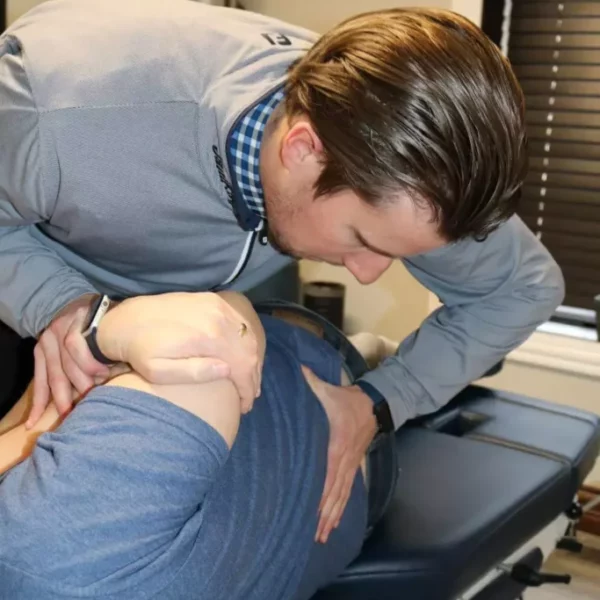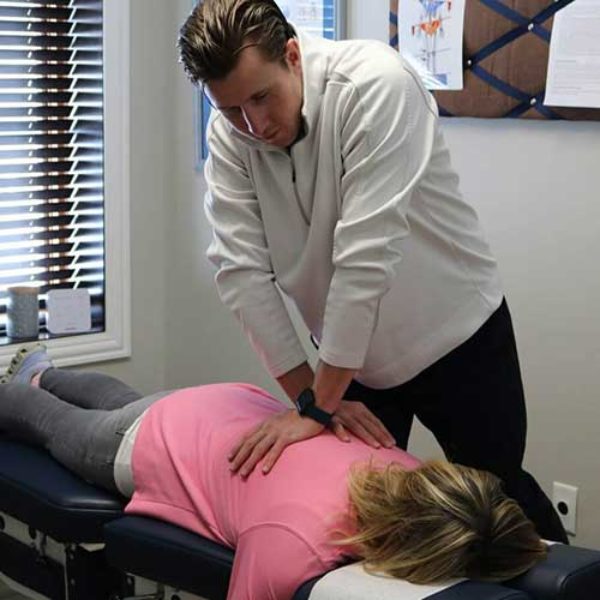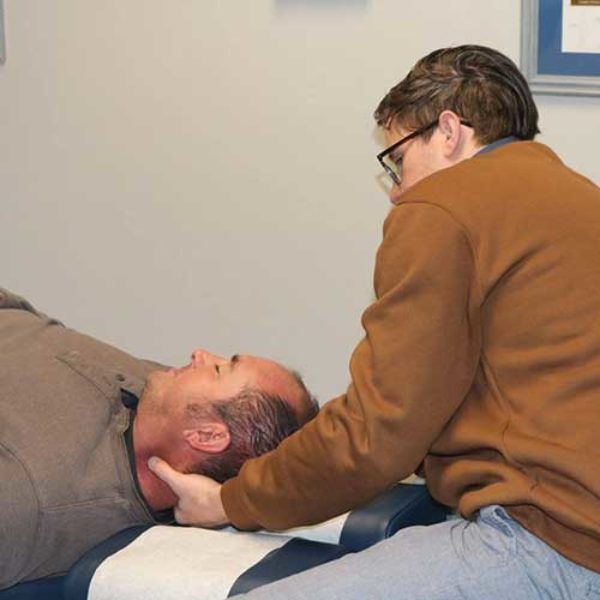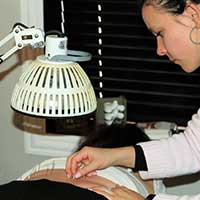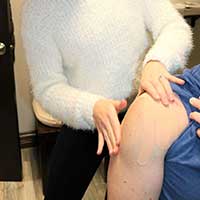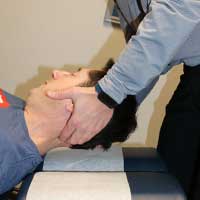Chiropractic for Degenerative Disc Disease
Chiropractic treatment can offer relief for people suffering from degenerative disc disease (DDD). This approach focuses on spinal manipulation to improve comfort and mobility. Many patients find this method helpful in managing pain and stiffness associated with the condition.
What Is Degenerative Disc Disease?
Degenerative disc disease refers to the condition where spinal discs wear down over time. As these discs deteriorate, they lose their ability to act as cushions for the spine. A chiropractor for degenerative disc disease can play a major role in managing this condition. Through spinal adjustments and manipulation, a chiropractor aims to improve spinal alignment and overall spinal function.
These adjustments can help in maintaining better spinal health and may assist in managing the progression of disc degeneration. Even more, a chiropractor often uses various techniques that promote a more active and functional spine, aiding in overall body wellness. This form of care provides a non-surgical approach to maintaining spinal health as one ages.
What Causes Degenerative Disc Disease?
Degenerative disc disease is primarily caused by the natural aging process. As people age, their spinal discs, which act as cushions between the vertebrae, start to wear out and lose their flexibility. This happens because the discs begin to lose fluid, making them less effective at absorbing shocks. In addition to aging, factors like daily physical activity, sports, and manual labor can accelerate disc wear and tear.
Smoking and obesity also contribute to the faster degeneration of these discs because they reduce blood supply to the spine and add extra stress, respectively. Genetics can play a role as well. Some people may be more predisposed to this condition due to their family history. Environmental and lifestyle choices may also impact the health of spinal discs.

Degenerative Disc Disease Symptoms
Degenerative disc disease leads to various symptoms that can affect daily life. The severity and type of symptoms can vary widely among individuals but the most common are:
- Back or neck pain. This is often the primary symptom, which might worsen with activities like bending or lifting.
- Radiating pain. Pain may extend from the affected area to the arms or legs, especially if nerve roots are compressed. Chiropractic for knee pain may help in such cases.
- Stiffness. The spine may feel stiff, limiting flexibility and making certain movements difficult.
- Numbness or tingling. These sensations can occur in the limbs if the nerves are impacted by the degenerating discs.
- Weakness. Muscles served by the affected nerves might weaken, affecting the ability to carry objects or perform tasks that require strength.
These symptoms reflect the progressive nature of degenerative disc disease, influencing mobility and everyday comfort.
Things to Avoid with Degenerative Disc Disease
Before starting degenerative disc disease treatment, there are certain activities and habits you should avoid to manage the condition effectively. Heavy lifting and high-impact exercises can exacerbate the wear and tear on your spinal discs, so these should be as limited as possible. Poor posture, especially while sitting for extended periods, also puts additional strain on the spine, and should be corrected to reduce stress on the discs.
Smoking is another factor to avoid as it decreases blood flow to the spine, slowing down healing processes and potentially worsening the condition. Additionally, maintaining a healthy weight is very important, as excess body weight can increase the load on your spine, leading to more significant degeneration over time.

Chiropractic Treatments for Degenerative Disc Disease
Effective treatment for degenerative disc disease is very important as it helps manage pain, maintain mobility, and improve overall quality of life. Among the various options, chiropractic care stands out as one of the best. Chiropractic treatments for degenerative disc disease focus on reducing spinal pressure and improving alignment, which can significantly relieve discomfort.
These treatments, which are part of broader degenerative disc disease therapies, include manual adjustments and other non-invasive techniques. By restoring proper spinal function and reducing nerve irritation, chiropractic care helps individuals achieve better movement and lessen pain. This holistic approach not only addresses the immediate discomfort but also aids in long-term spinal health.
Chiropractic Adjustments
A DDD chiropractor specializes in treating degenerative disc disease through chiropractic adjustments. These adjustments involve the chiropractor using their hands or specialized tools to apply controlled force to specific parts of the spine. The goal is to improve spinal alignment and function, which can help reduce the discomfort associated with DDD. By restoring proper movement and reducing nerve interference, these adjustments can aid in relieving pain and improving mobility.
Spinal Decompression
Spinal decompression is one of the degenerative disc disease chiropractic treatment techniques used to relieve pressure on the spine. This method involves stretching the spine using a traction table or similar motorized device, which can help promote the movement of water, oxygen, and nutrient-rich fluids into the discs so they can heal. Through gentle stretching, spinal decompression aims to create negative pressure within the disc, which can help retract or reposition the disc material. This reduces pressure on the nerves and other structures in your spine.
Therapeutic Massage
Therapeutic massage is a very effective technique used in treating chiropractic for degenerative disc disease. It involves the manipulation of soft tissues to improve circulation, reduce muscle tension, and promote relaxation. This method helps address pain by improving blood flow, which aids in the healing and maintenance of the spinal discs. It not only addresses the pain directly associated with degenerative disc disease but also helps manage the stress and stiffness that often accompany it.

Benefits of Chiropractic Care for Degenerative Disc Disease
Chiropractic care offers several benefits when managed by a degenerative disc disease chiropractor. Here are some key advantages of using chiropractic care:
- Pain Relief. Chiropractic adjustments can reduce the pressure on affected discs and nerves, leading to significant pain reduction.
- Improved Mobility. Regular treatments can help improve flexibility and range of motion, making daily activities easier and less painful.
- Non-Invasive Solution. Chiropractic care provides a non-surgical option to manage and treat spinal issues related to degenerative disc disease.
- Enhanced Spine Health. Continuous chiropractic care helps maintain spine alignment, which can prevent further degeneration of spinal discs.
For the maximum result of such treatment it is recommended to seek help of a licensed and experienced chiropractor.
Degenerative Disc Disease Treatment at Cross-Up Chiropractic
At Cross-Up Chiropractic we provide our patients with a comprehensive approach that combines the latest chiropractic techniques with personalized care plans. This ensures that each patient’s specific needs are addressed effectively to achieve the best possible outcomes. One of the key benefits is use of state-of-the-art technology for diagnosis and treatment, which allows for precise adjustments.
At our chiropractic clinic we also offer flexible scheduling and a supportive environment, making it convenient for our patients to receive regular treatments. All in all, Cross-Up Chiropractic is committed to your spinal health and helping you lead a more active, pain-free life.
Chiropractor – Reviews
Why People Choose our Chiropractors?
Because it’s not about us, it’s about you. We are always looking for your feedback during care because success requires teamwork. You do all the healing, we just have some cool tools and gifted hands to speed it up!

Trusted & Honest Chiropractors

Innovative Chiropractic Treatments
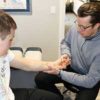
Personalized Care
“Our focus is on finding and fixing the underlying problem – not just masking it.”
Degenerative Disc Disease Chiropractor – Frequently Asked Questions (FAQ)
Is chiropractic treatment safe for people with degenerative disc disease?
Yes, chiropractic treatment is generally considered safe for people with degenerative disc disease, provided it is performed by a licensed and experienced chiropractor. The chiropractor will assess your specific condition and customize the treatment to suit your needs and limitations.
What does a chiropractor do for degenerative disc disease?
A chiropractor treats degenerative disc disease using spinal adjustments, flexion-distraction, manual therapy, and therapeutic exercises to alleviate pain, improve spinal alignment, and enhance overall mobility. They also provide lifestyle advice to help manage symptoms and prevent further disc degeneration. Each treatment plan is tailored to the individual’s specific needs.
How many chiropractic sessions will I need?
The number of chiropractic sessions required can vary depending on the severity of your condition, your response to treatment, and your overall health. Some patients may experience relief after a few sessions, while others may need ongoing care to manage their condition effectively.
What should I do if my symptoms worsen after a chiropractic session?
If your symptoms worsen after a chiropractic session, it’s important to contact your chiropractor immediately. They may adjust your treatment plan or recommend additional diagnostic tests to better understand your condition and needs.
Conditions We Treat With Chiropractic
CHIROPRACTORS FOR FAMILY CARE AND SPORTS MEDICINE
Chiropractic + Rehab
Additional Services We Offer
It is our goal to provide you with the highest quality of care and a successful experience. Our family taking care of yours!
Contact Us
We value trust and honesty at Cross-Up Chiropractic and strive to provide all of our patients with the best health care experience. Please feel free to ask us any questions, so that we may comfort your mind and accommodate your needs.


